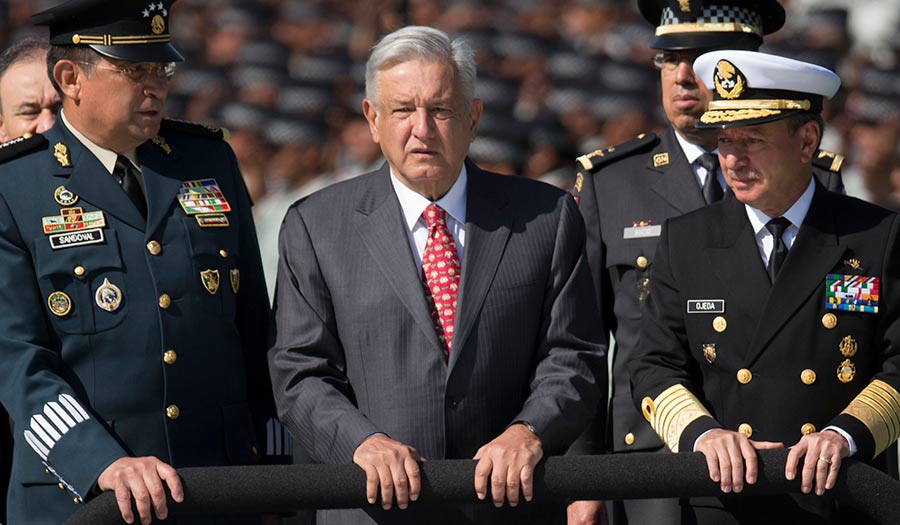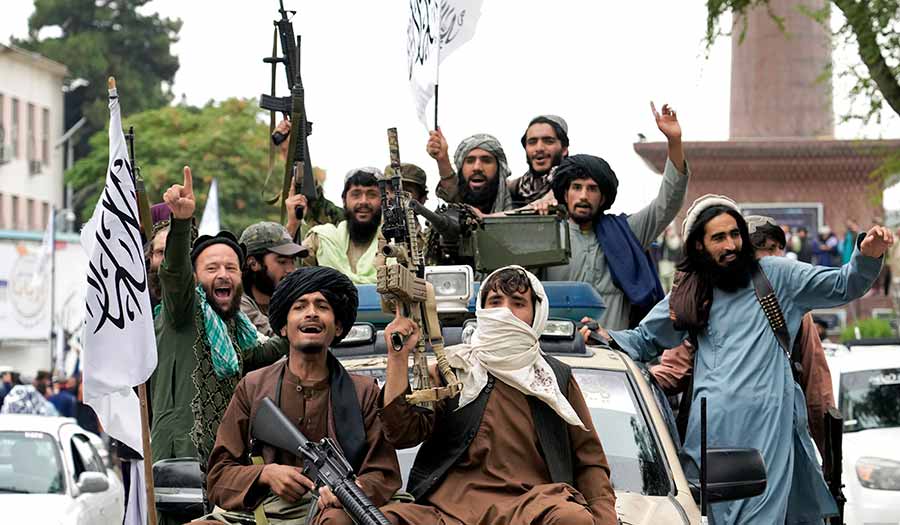 AP/Christian Palma
AP/Christian Palma
World News Desk
Learn the why behind the headlines.
Subscribe to the Real Truth for FREE news and analysis.
Subscribe NowTijuana, Mexico (AP) – Days of widespread drug cartel arson and shootings in four states last week have left Mexicans asking why the drug cartels exploded and what do they want.
The attacks killed 11 people, including a young boy and four radio station employees who were randomly shot on the streets of the border city of Ciudad Juarez, across from El Paso, Texas, on Thursday.
Two days earlier, more than two dozen convenience stores owned by a well-known national chain were set ablaze in the northern state of Guanajuato. Cars and buses were commandeered and burned in neighboring Jalisco state. And two dozen vehicles were hijacked and set on fire in cities on the California border Friday.
The federal government deployed soldiers and National Guard troops to calm residents’ fears, but the outbursts of violence raised questions about President Andres Manuel Lopez Obrador’s approach of putting all responsibility for security in the hands of the military rather than civilian police forces.
Some were quick to brand the arson and shooting attacks as terrorism, while the government denied it. Interior Secretary Adan Augusto Lopez said, “They are not terrorist attacks; you don’t have to exaggerate the facts.”
But it is not clear what the goal was.
“I think that the orders that were given to these gunmen was to cause chaos,” said Mexican security analyst Alejandro Hope. “Generate chaos, generate uncertainty, generate fear, shoot at anything that moves. That is something that generates terror.”
But, Mr. Hope added: “Terrorism implies a political goal. I don’t know what the political goal is in this case.”
Mr. Lopez Obrador suggested Monday the attacks were part of a political conspiracy against him by opponents that he describes as “conservatives” and he argued that “there is no big problem” with security.
“I don’t know if there was a connection, a hidden hand, if this had been set up,” he said. “What I do know is that our opponents, the corrupt conservatives, help in the black propaganda.”
Defense Secretary Luis Cresencio Sandoval said later that the cartels had lashed out because they have been weakened. “They want to still feel like they’re strong and they generate violent situations where by way of publicity they send messages that they are still strong,” he said.
Tijuana Mayor Montserrat Caballero sounded very different when she issued a strange public appeal Friday to the cartels to stop targeting innocent civilians.
“Today we are saying to the organized crime groups that are committing these crimes that Tijuana is going to remain open and take care of its citizens,” Ms. Caballero said in a video. “And we also ask them to settle their debts with those who didn’t pay what they owe, not with families and hard-working citizens.”
Jose Andres Sumano Rodriguez, a professor and security specialist at the Northern Border College in Matamoros, a city on the border with Texas, said the decision of targeting civilians was a considered one.
The cartels “have learned that when they pressure on the side of generating terror and attacks on civilians, it gives them good results,” he said. “Often it is much more effective to do this than have direct confrontation with the armed forces, where they are almost always going to lose.”
For security analyst David Saucedo, the attacks were “narco terrorism,” and he said the Jalisco New Generation Cartel was behind the violence in the states of Guanajuato and Baja California.
Mr. Saucedo said there has been a change in Mexico’s drug policy since last year, when soldiers at roadside bases simply watched as cartels battled for control of the western state of Michoacan with bomb-dropping drones, IEDs and land mines.
Mr. Saucedo said the change may have angered the cartels.
Mexico has made more attempts to capture drug lords, something Mr. Lopez Obrador previously said he was not interested in. Mexican marines captured fugitive drug lord Rafael Caro Quintero in July after years on the run for the 1985 killing of DEA agent Enrique “Kiki” Camarena.
And Mexico’s seizures of meth labs and the synthetic opioid fentanyl have risen sharply in recent months.
“There has been a change in the strategy in fighting drug cartels. Andres Manuel [Lopez Obrador] has been very much criticized recently for his ‘hugs, not bullets’ strategy,” Mr. Saucedo said. “I think that due to pressure from Joe Biden, he is changing that and agreeing to capture high-profile drug traffickers.”
The spark that set off the chaos in Jalisco and Guanajuato last week was apparently the military coming upon a meeting involving a boss from the Jalisco cartel. Mr. Sandoval, the defense secretary, said the soldiers had not known about it and were just trying to intercept a cartel convoy.
“The narco terrorism of the Jalisco New Generation Cartel is a reaction to the president’s change in strategy,” Mr. Saucedo said. “If the Mexican president continues with this strategy of capturing high-ranking members of the Jalisco cartel, the Jalisco cartel is going to respond with acts of narcoterrorism in the states it controls as part of its vast empire.”
- World News Desk
- ASIA
 Afghanistan Marks 1 Year Since Taliban Seizure as Woes Mount
Afghanistan Marks 1 Year Since Taliban Seizure as Woes Mount
More on Related Topics:
- San Diego Is the Latest Hot Spot for Illegal Border Crossings. But Routes Change Quickly
- As Gang Conflict Rages, Violence Is Traumatizing Haitian Kids
- As the U.S. Moves to Reclassify Marijuana as a Less Dangerous Drug, Could More States Legalize It?
- At Least 2,000 People Arrested in Pro-Palestinian Protests on U.S. Campuses, AP Tally Shows
- Colombia’s Capital Starts Rationing Water After Reservoirs Hit Historically Low Levels


